Top 34 Quotes & Sayings by Kelly Carlin-McCall
Explore popular quotes and sayings by an American actress Kelly Carlin-McCall.
Last updated on April 19, 2025.
For me, psychology and art interact and overlap in so many ways. Psychology is the study of the inner life and creativity comes from the imagination and a response to the environment, as you know. So they're both very similar in that way because it's about one's inner life interacting with the environment and what comes from that.
There's a real careful line you have to walk there because your first job [therapist] is to create safety for the client to feel safe enough to turn their vision in towards themselves and their experience in the moment and to reveal things that usually carry a lot of shame or that kind of stuff around.
I have known know many therapists who come out of Pacifica Graduate Institute and love being both artists and therapists at the same time, like Maureen Murdock. They are photographers and dancers and other kinds of things and therapists at the same time. I think it really makes them a much more interesting therapist because they're so engaged with the imagination and the creativity and the depths of who they are.
Coming out of graduation, I didn't immediately know what direction I wanted to do so I decided to just stay as an intern until it really kind of dawned on me and I felt more compelled one way or the other. So I gave it a few years and then after two years it was really clear that deep down I missed being a full time creative artist. Ironically, I started getting clients who were all in the entertainment industry and a lot of them were in comedy!
I had a client who just wanted to entertain me the whole time, that is a defense against going deep, in my mind. What happens when the jokester is not allowed to deflect with humor? You then have to feel the pain, and learn that you can survive it. It makes you more resilient and stronger in the long run, and your sense of humor will always be there. Being able to see the funny is deep.




















